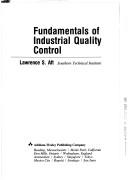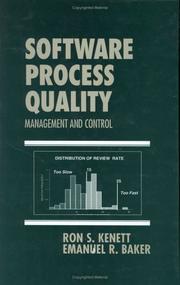| Listing 1 - 10 of 2054 | << page >> |
Sort by
|
Periodical
Year: 1967 Publisher: Milwaukee, Wis. : American Society for Quality Control (ASQC),
Abstract | Keywords | Export | Availability | Bookmark
 Loading...
Loading...Choose an application
- Reference Manager
- EndNote
- RefWorks (Direct export to RefWorks)

ISBN: 0201109018 Year: 1986 Publisher: Reading Addison-Wesley publishing company
Abstract | Keywords | Export | Availability | Bookmark
 Loading...
Loading...Choose an application
- Reference Manager
- EndNote
- RefWorks (Direct export to RefWorks)
Book
ISBN: 9789201028211 9201028210 Year: 2021 Publisher: Havertown : International Atomic Energy Agency,
Abstract | Keywords | Export | Availability | Bookmark
 Loading...
Loading...Choose an application
- Reference Manager
- EndNote
- RefWorks (Direct export to RefWorks)
Book
ISBN: 9781641139052 1641139056 9781641139038 1641139048 9781641139045 Year: 2020 Publisher: Charlotte, NC
Abstract | Keywords | Export | Availability | Bookmark
 Loading...
Loading...Choose an application
- Reference Manager
- EndNote
- RefWorks (Direct export to RefWorks)
"Quality function deployment (QFD) is an effective tool to help organizations to become more competitive by designing their products and services to satisfy customers' requirements. This book is precise and direct and focuses on the key issues in building the House of Quality otherwise known as Quality Function Deployment (QFD). By reading this book, the manager understands how to solicit customer requirement information, how design requirements are matched to customer requirements, how priorities of customer needs are established, and how activities are benchmarked. Furthermore, this new edition further expands the topic to include process change initiatives on the premise that QFD cannot be achieved if the organization itself is not transformed to achieve customer satisfaction. The manager is guided on how to solve critical problems to achieve customer satisfaction. The book guides the reader to understand how companywide quality activities are related to QFD. This association is often lacking in other presentations that treat QFD as if it is independent of other quality efforts, such as process change initiative. The books will therefore include information on related quality initiatives such as: Identification of customer needs, Benchmarking & re-engineering, Strategic planning, Quality assurance, Stakeholder teams, Concurrent engineering, Cost control & productivity improvement, Six sigma, Process change initiative"--
Book
Year: 2023 Publisher: London : IntechOpen,
Abstract | Keywords | Export | Availability | Bookmark
 Loading...
Loading...Choose an application
- Reference Manager
- EndNote
- RefWorks (Direct export to RefWorks)
Quality control has played an important role in the manufacture of goods and the creation of monuments since antiquity. From the development of Heron's first robot and the Antikythera mechanism to today's Internet of Things (IoT), Industry 4.0, and artificial intelligence, quality control has undeniably come a long way. This book examines quality control in several different scenarios and locations. Chapters discuss quality control of Nigeria's road network, Ethiopia's leather industry, Africa's food industry, and Hong Kong's construction sector, among other scenarios. The book also discusses quality control of intrusion detection systems, artificial intelligence, complementary metal oxide semiconductors, and more.
Quality control. --- Quality control --- Auditing.
Book
ISBN: 953515141X 9535108689 Year: 2012 Publisher: IntechOpen
Abstract | Keywords | Export | Availability | Bookmark
 Loading...
Loading...Choose an application
- Reference Manager
- EndNote
- RefWorks (Direct export to RefWorks)
Quality control has an emerging importance in every field of life. Quality control is a process that is used to guarantee a certain level of quality in a product or service. It might include whatever actions a business deems necessary to provide for the control and verification of certain characteristics of a product or service. With the improvement of technology everyday we meet new and complicated devices and methods in different fields. Quality control should be performed in all of those new techniques. In this book "Latest Research Into Quality Control" our aim was to collect information about quality control in many different fields. The aim of this book is to share useful and practical knowledge about quality control in several fields with the people who want to improve their knowledge.
Quality control --- Auditing. --- Production & quality control management
Book
ISBN: 1951058747 1523132353 1951058739 9781951058739 9780873899819 0873899814 9781951058746 9781523132355 Year: 2019 Publisher: Milwaukee, Wisconsin
Abstract | Keywords | Export | Availability | Bookmark
 Loading...
Loading...Choose an application
- Reference Manager
- EndNote
- RefWorks (Direct export to RefWorks)
"Book is a handbook and reference for working certified quality inspectors as well as a study guide for those preparing to sit for their CQI exam, covering such topics as basic math, algebra, geometry,and trigonometry, measurement systems, gages and inspection equipment, calibration and MSA, blueprints and GDT, sampling, statistical process control, and quality improvement, auditing, tools, and techniques"--
Quality control --- Quality control inspectors --- Certification
Book
ISBN: 0128025417 0128023015 9780128025413 9780128023013 Year: 2016 Publisher: Amsterdam, [Netherlands] : Morgan Kaufmann,
Abstract | Keywords | Export | Availability | Bookmark
 Loading...
Loading...Choose an application
- Reference Manager
- EndNote
- RefWorks (Direct export to RefWorks)
Software Quality Assurance in Large Scale and Complex Software-intensive Systems presents novel and high-quality research related approaches that relate the quality of software architecture to system requirements, system architecture and enterprise-architecture, or software testing. Modern software has become complex and adaptable due to the emergence of globalization and new software technologies, devices and networks. These changes challenge both traditional software quality assurance techniques and software engineers to ensure software quality when building today (and tomorrow’s) adaptive, context-sensitive, and highly diverse applications. This edited volume presents state of the art techniques, methodologies, tools, best practices and guidelines for software quality assurance and offers guidance for future software engineering research and practice. Each contributed chapter considers the practical application of the topic through case studies, experiments, empirical validation, or systematic comparisons with other approaches already in practice. Topics of interest include, but are not limited, to: quality attributes of system/software architectures; aligning enterprise, system, and software architecture from the point of view of total quality; design decisions and their influence on the quality of system/software architecture; methods and processes for evaluating architecture quality; quality assessment of legacy systems and third party applications; lessons learned and empirical validation of theories and frameworks on architectural quality; empirical validation and testing for assessing architecture quality. Focused on quality assurance at all levels of software design and development Covers domain-specific software quality assurance issues e.g. for cloud, mobile, security, context-sensitive, mash-up and autonomic systems Explains likely trade-offs from design decisions in the context of complex software system engineering and quality assurance Includes practical case studies of software quality assurance for complex, adaptive and context-critical systems
Book
ISBN: 1908818379 1907568581 9781908818379 9781907568589 Year: 2016 Publisher: Amsterdam, [Netherlands] : Woodhead Publishing,
Abstract | Keywords | Export | Availability | Bookmark
 Loading...
Loading...Choose an application
- Reference Manager
- EndNote
- RefWorks (Direct export to RefWorks)

ISBN: 0429222068 1135548757 9786610096756 0585135193 1280096756 020390978X 9780203909782 9780585135199 9780824746674 0824746678 6610096759 9780824717339 0824717333 9781135548759 9781280096754 9780429222061 1135548749 Year: 1999 Publisher: New York : Marcel Dekker,
Abstract | Keywords | Export | Availability | Bookmark
 Loading...
Loading...Choose an application
- Reference Manager
- EndNote
- RefWorks (Direct export to RefWorks)
Using actual examples of software process improvement from the private sector and government, this work demonstrates how quality systems, measurement techniques and performance evaluations work. It presents a methodology for analyzing an ongoing software development process and establishing a rational plan for process improvement.
| Listing 1 - 10 of 2054 | << page >> |
Sort by
|

 Search
Search Feedback
Feedback About UniCat
About UniCat  Help
Help News
News